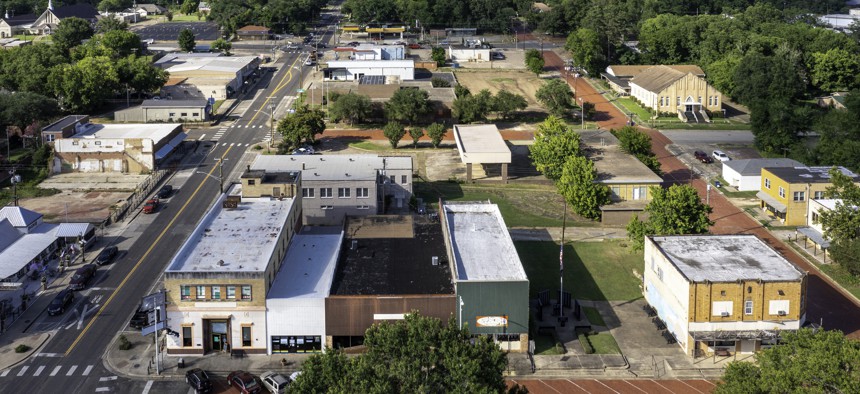Relocation Programs Continue to Grow in Numbers in Rural America

Michael Warren via Getty Images
By one count, more than 50 rural communities offer some sort of incentive to entice new residents.
This article first appeared on The Daily Yonder.
From free lots for building a house to cash to dinners, rural communities are offering a variety of incentives to entice people to their communities as part of relocation programs.
One area that hopes to see an increase in population—although by how much is unclear—is Duncan, Oklahoma, population 22,700.
Duncan is one of the latest rural communities to offer incentives to lure people to move there. Called “Move Duncan,” the talent relocation program aims to attract remote workers and qualified candidates for local businesses and organizations. It offers $4,000 over a three-year period for people to relocate to the community. .
“Our goal is to help people see how great of a community Duncan is to live and work while supporting our local businesses in attracting talented workers and families to our community,” said Henry Lehr with the Duncan Area Economic Development Foundation in an interview with the Daily Yonder. “Duncan sets itself apart as not just a great place to raise a family, but we have so much opportunity in our business community for great jobs close to home.”
According to MakeMyMove.com, a website collating relocation programs across the U.S, there are currently more than 50 such programs in rural parts of the country.
Recent data, in fact, shows that rural areas may be growing after a decade of population loss.
Kenneth M. Johnson, professor of Sociology and senior demographer at the University of New Hampshire, recently wrote that “Census Bureau population estimates document renewed population gains in nonmetropolitan America between April 2020 and July 2021.”
The change occurred because a substantial net migration gain offset the growing excess of deaths over births fostered by Covid-19.
While some rural areas are offering cash incentives, others offer other amenities.
In Lincoln County, Kansas, in addition to cash, newcomers can receive credit toward high-speed Internet and a welcome potluck dinner, among other amenities.
In Newton, Iowa, through a housing initiative, if the home built is worth $190,000 or more, homebuyers will receive a $10,000 cash incentive and a welcome package, said Bruce Showalter, housing director at the Newton Housing Development Corp.
If “we didn't do something the city was going to just deteriorate and continue to lose population. So we came up with this program,” Showalter told the Daily Yonder.
The program, which has been around since 2014, has allocated 100 building permits, he said, about half of which were new people to the community. In addition to the cash incentive, there is a welcome package, which includes a free subscription to the newspaper and a membership at the YMCA, among other perks.
Showalter said it’s imperative for rural communities to find ways to attract new people and housing to the communities.
“My personal opinion is, if you're not building new houses and or upgrading your housing stock, then you're dying,” he said.
Cheryl Burkhart-Kriesel, an associate professor of agricultural economics and extension specialist in the Panhandle Research, Extension, and Education Center at the University of Nebraska, said the rural communities that are offering relocation programs “still need to have a great presence on the web to really entice people to take a second look at them as a possible relocation site.”
Burkhart-Kriesel’s work focuses on helping rural communities “up their game,” through attracting people and getting them to relocate, she told the Daily Yonder.
“The program then helps them build a simple marketing plan and implement it to better showcase their assets to those thinking about relocating,” she said.
Generally speaking, she said, rural areas have a tendency to under sell themselves as a place to live, work and play.
“About 10 years ago, I worked with a research team looking at the push and pull factors in the rural western Nebraska area and the one overriding suggestion newcomers made was that rural communities don’t showcase what they have available to people wanting to relocate. People came to rural places and found a lot more than they expected,” Burkhart-Kriesel said.
She added that rural communities may not see some of their assets as attractive because they may be taken for granted.
“That is why a community conversation about what they have and perhaps what needs to be upgraded, expanded or even lifted up/promoted, especially on the web, can be so important.”
NEXT STORY: States Put Grocery Taxes on Ice





